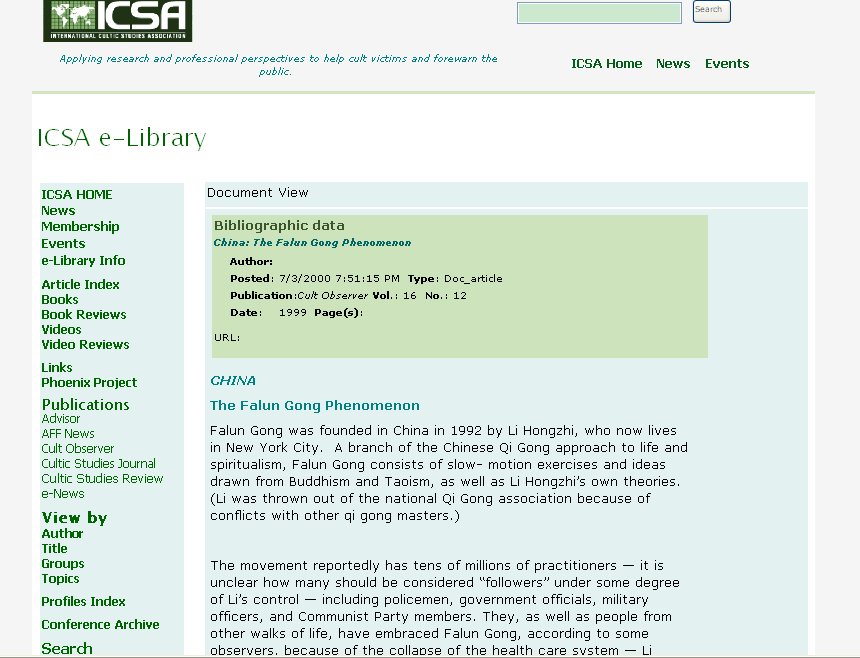Falun Gong was founded in China in 1992 by Li Hongzhi, who now lives in New York City. A branch of the Chinese Qi Gong approach to life and spiritualism, Falun Gong consists of slow- motion exercises and ideas drawn from Buddhism and Taoism, as well as Li Hongzhi's own theories. (Li was thrown out of the national Qi Gong association because of conflicts with other qi gong masters.)
The movement reportedly has tens of millions of practitioners — it is unclear how many should be considered "followers" under some degree of Li's control — including policemen, government officials, military officers, and Communist Party members. They, as well as people from other walks of life, have embraced Falun Gong, according to some observers, because of the collapse of the health care system — Li preaches self-healing — and other social safety networks, even the educational system, and an absence of spirituality in an officially atheist society.
The government, for its part, says that it considers Falun Gong a "cult," a social "opiate," and a threat to social stability because it has a theory of imminent doomsday; its leader says that scientific reasoning and common sense are to be avoided; followers are not to take medicine or undergo medical treatment; and Falun Gong organizes gatherings to harass the government, media, and schools as "revenge" on a society they don't like, thus disturbing public order. The government says that Falun Gong "brainwashes" followers and has caused more than 1,400 deaths by urging followers not to seek medical care. (The government reportedly once praised Falun Gong for saving money for the medical system.) For its part, Falun Gong says it has no official organization, no services, no donations, and no politics.
Shocked by events such as the sudden appearance of a 10,000-person strong peaceful Falun Gong protest that surrounded Communist Party head-quarters in Beijing, the government's response to the movement has been strong and direct. Falun Gong has been banned and tighter controls have been placed on other qi gong associations throughout China. The national assembly passed special legislation to suppress Falun Gong, and a propaganda campaign has been mounted to warn the population of its dangers. Leading members in China have been sentenced to prison and many others have been jailed, detained, or sent to "reeducation" facilities for convening protests or group activities. (Cult Observer report)
"Real" Reason for Crackdown on Falun Gong
By and large, Westerners believe in a supernatural being, but Chinese believe that a living person can become supernatural through some process or spiritual pathway. Understanding this is key to understanding why China's government is attacking Falun Gong. The government's outrageous response to Falun Gong — arresting followers and burning literature — should be condemned, but it is not simply a political power play. Rather, it is an attempt to root out the superstition that threatens the social order in China.
"Gong" has the connotation of "attaining supernatural power," not simply exercise or relaxation. While Westerners seek salvation after death, Chinese constantly seek a path leading to a supernatural state while still alive. At any time there are hundreds if not thousands of various kinds of "gong" going in Chinese society. Around 1900, followers of the Boxer Rebellion believed they had attained supernatural power and that their bodies were impervious to weapons. Twenty million died. So Falun Gong is old wine in new bottles. Leader Li Hongzhi is already considered a supernatural being, said to have attained such powers as seeing the future, healing the sick, protecting all his followers. Those on lower rungs can see a thousand miles away and perform other supernatural feats.
People in the U.S with such beliefs usually cause little harm. The worst that happens is when, as in the Heaven's Gate mass suicide or the Branch Davidian confrontation in Texas, a few people lose their lives. There is little effect on the lives of other or on society as a whole. But in China, when a hundred million suddenly think they are as supernatural and immortal as God, the societal consequence is quite dangerous. Imagine a hundred million Branch Davidians in the U.S. For China to ban Falun Gong does not mean that people can't practice qi gong. What it discourages is the pursuit of gong that promises immortal life and supernatural powers. (Hat Lau, "The real reason for crackdown on Falun Gong," San Jose Mercury News, 8/8/99)
(Cult Observer, 1999)

Original text from: http://www.icsahome.com/logon/elibdocview_new.asp?Subject=China%3A+The+Falun+Gong+Phenomenon





